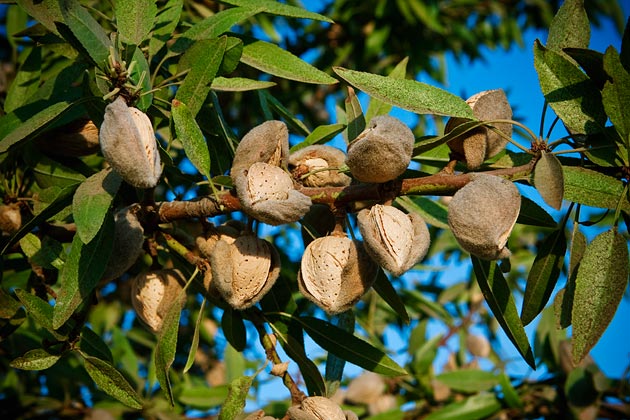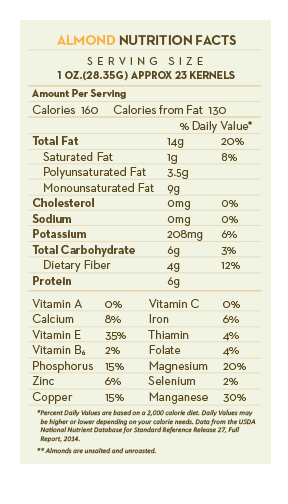 Do you eat almonds?
Do you eat almonds?
Get the most out of amazing almonds. Almonds appear amazing in many ways! Is it only the amount of almonds per day you have to calculate?
Did you know? Almonds (Prunus dulcis) are part of the Peach family (Prunus persica) and have been classified as a fruit.
This past Summer I did further research on the balance of Omega-6s to Omega-3s for many different foods…which included nuts. I was very surprised at what I discovered and it only adds to how important moderation and the big picture are to the quantity consumed. There are others that are not consuming nuts at all and with a good nutritional reason.
What is a suggesting serving? Appears around 1 oz or 1/4 cup or 24 almonds
So how many servings should one consume?
What kinds of almonds are best? The more natural the better this means raw and possibly soaked (more available, enzyme rich, etc.). If roasted, then vitamins and other nutritional value would be destroyed/denatured which would include the vitamins, fat and protein as they are susceptible to heat. If other ingredients are added like vegetable oils, salt or seasonings, then the nutritional value and calories would change. As you know I don’t recommend most of the vegetable oils on the market (i.e. refined canola. soybean, sunflower, etc.)
 The possible benefits of almonds as per various articles and research:
The possible benefits of almonds as per various articles and research:
- Lowered “Bad” Cholesterol
- Lowered Blood Sugar
- Lowers the Risk of Heart Attacks and Alzheimer’s
- Faster Weight Loss
- Improved Immune System Function
- Keep you full longer because of the protein, fat, etc.
- Low on the Glycemic Index (good for blood sugar)
- Major Source of Vitamin E
The possible side-effects of eating almonds…what, there are side-effects?
- Weight Gain
- Medication Interactions
- Vitamin E Overdose
- Gastrointestinal Problems (from increased fiber)
- Omega-6 to Omega-3
 If we should strive for a 1:1 balance of Omega-6 to Omega-3 then almonds are way off the chart. Because it is plant, it would affect people differently. I discovered the ratio is 2000:1 Omega-6 to Omega-3. When we have more Omega-6s in our diet than Omega-3s we are not balanced. Omega-6s are pro inflammatory. Inflammation is part of every disease.
If we should strive for a 1:1 balance of Omega-6 to Omega-3 then almonds are way off the chart. Because it is plant, it would affect people differently. I discovered the ratio is 2000:1 Omega-6 to Omega-3. When we have more Omega-6s in our diet than Omega-3s we are not balanced. Omega-6s are pro inflammatory. Inflammation is part of every disease.
My guidelines for you would be the following:
- Drink water when eating almonds (or any nuts) to match the fiber (can vary from person to person).
- Eat one serving or less daily. If you are gaining weight or not losing or have digestive issues, try eating less or not eating them every day. If you are not eating almonds, continue to do so unless you wish to enjoy almonds because of what you read. The nutrition in almonds can be had in other foods.
- Eat a variety of nuts and seeds but also of other whole natural foods like vegetables, eggs, etc.
- For a balance of Omega-6 and Omega-3 consider getting plant, and mammalian due to its effectiveness. My recommendation is mammalian omega 3 from seal oil. If eating animal is not for you then you should get your levels measured as most do not convert enough plant forms of omegas.
 Other questions? Does it matter what kind of almonds, where they are grown, if they are pasteurized or not, etc.? Some are concerned about what is being done to our food in general. First rule of thumb…what you choose to eat, enjoy. Second rule of thumb…educate yourself so you can make healthy choices.
Other questions? Does it matter what kind of almonds, where they are grown, if they are pasteurized or not, etc.? Some are concerned about what is being done to our food in general. First rule of thumb…what you choose to eat, enjoy. Second rule of thumb…educate yourself so you can make healthy choices.
Did you know? The almond is a deciduous tree, growing 4–10 metres (13–33 ft) in height, with a trunk of up to 30 centimetres (12 in) in diameter.
Nutrition Profile – whole shelled raw almonds
Also contains minerals, vitamins and more: calcium, zinc, magnesium, vitamins E and B2, copper, manganese, potassium, tocopherols, arginine, phytosterols and unsaturated fatty acids.
Essential Fatty Acids – Profile
Fatty acids, total polyunsaturated 3.416 g
Omega 6 – 18:2 n-6 c,c 3.412 g
References:
1) Nutrition Panel http://caloriecount.about.com/cc/help.php?id=66
2) Prevention http://www.livestrong.com/article/500406-natural-vs-roasted-almonds/
3) USDA Chart http://en.wikipedia.org/wiki/Almond
***

Cheryl Millett
Champion for your better health…






